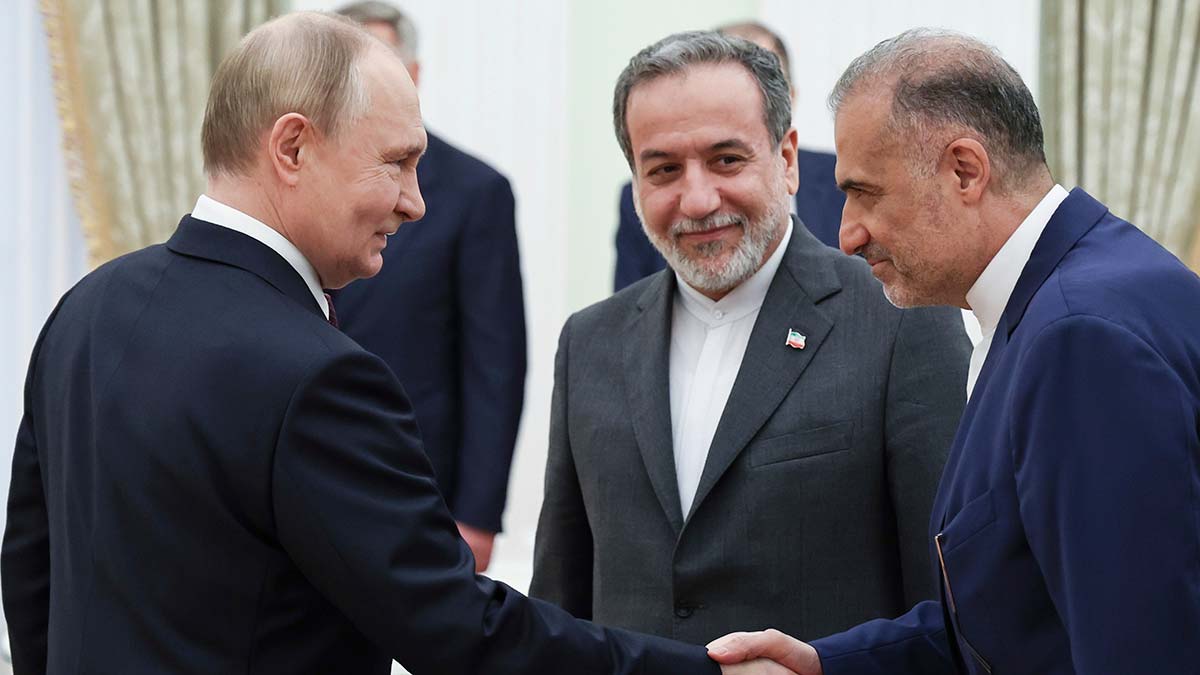How Putin ditched Iran during the 12-day war with Israel: 'We gave them drones, but got no S-400s in return'
 Allies forever: Russian President Vladimir Putin greets Iranian Ambassador Kazem Jalali (right) and Foreign Minister Abbas Araghchi at the Kremlin in Moscow, on June 23 | AP
Allies forever: Russian President Vladimir Putin greets Iranian Ambassador Kazem Jalali (right) and Foreign Minister Abbas Araghchi at the Kremlin in Moscow, on June 23 | AP
On Monday, Iran's former deputy parliament speaker made a scathing remark at Russia, even naming its President Vladimir Putin. Ali Motahari, a conservative Iranian leader, minced no words when he criticised Russia for refusing to provide Iran with the S-400 air defence systems even after Iran supplied the country with Shahed drones during its war with Ukraine.
Motahari said: "Russia has given the S-400 air defence system to Turkey and Saudi Arabia, but does not give it to Iran, which has provided it with drone assistance in the war with Ukraine, because it might be used against Israel. This is what the strategic cooperation with Iran that Mr. Putin talks about looks like," the former MP wrote on X.
Motahari's words reflect the disappointment in Tehran with Russia. Many believe Putin ditched Tehran when it mattered the most, due to its complex relationship with Israel. Iran has been a main supporter of Russia against its war in Ukraine and Russia is its fifth-largest trading partner. Both countries also signed a 20-year strategic partnership agreement recently.
But, during the 12-day war, the Kremlin, already busy in Ukraine, gave no military help, possibly because it did not have any military resources to spare.
Neil Quilliam, a Middle East expert at Chatham House, told the Kyiv Independent that Russian-Iranian relations will continue as business as usual but things have changed. "Behind closed doors, however, Iran's confidence in Russia has been undermined, and this no doubt will weaken the relationship. Tehran has learned to its cost that Russia is no longer a dependable ally," Quilliam said.
Russia has always maintained a good relationship with Israel, which Putin wants to preserve. Ian Garner, a geopolitical expert and an assistant professor of totalitarian studies at the Pilecki Institute in Warsaw, opines that even if the capacity did exist, Putin wouldn't want to provoke Israel, home to over a million Russian speakers. "Moreover, as Russian military production capacity has improved, Russia’s reliance on Iranian drone technology has decreased. Even if he could, Putin would have little to gain by aiding Iran militarily," Garner wrote in Unherd.
Despite the outward appearance, both countries deeply distrust each other, as evident from the recently leaked documents from the FSB’s counterintelligence service which revealed how both countries are actively spying on one another. Sources in the Russian intelligence services claim Russia still views Iran more as an enemy than an ally and does not want to allow Tehran to acquire nuclear weapons.
The documents also shed light on the activities of Iranian intelligence agencies in infiltrating Russian industrial, scientific research, design and engineering enterprises.
That said, Moscow can still help Iran in many ways, including providing diplomatic backing in the (UN) Security Council. "It will need help rebuilding its air defences and its missile programme. Whether Russia can afford to sell or share that kind of equipment is an open question," Aron Lund, a Middle East analyst at Century International, told the Kyiv Independent.
Middle East